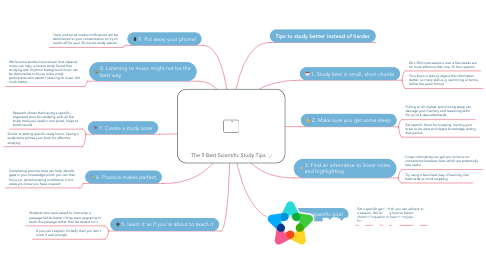The 9 Best Scientific Study Tips
by Olivia Jardine

1. Tips to study better instead of harder
2. 1. Study best in small, short chunks
2.1. 20 x 30minute sessions over a few weeks are far more effective than one 10 hour session
2.2. Your brain is able to digest the information better, so many skills e.g. swimming or tennis, follow the same format
3. 2. Make sure you get some sleep
3.1. Pulling an all-nighter and missing sleep can damage your memory and reasoning skills for up to 4 days afterwards
3.2. Set specific hours for studying, training your brain to be alert and digest knowledge during that period
4. 3. Find an alternative to linear notes and highlighting
4.1. Linear note taking can get you to focus on connections between facts which are potentially less useful
4.2. Try using a less linear way of learning, like flashcards or mind mapping
5. 4. Set a specific goal
5.1. Set a specific goal which you can achieve in a session, like learning how to balance a chemical equation or how to conjugate French verbs
6. 5. Learn it as if you're about to teach it
6.1. Students who were asked to memorise a passage did far better if they were preparing to teach the passage rather than be tested on it
6.2. If you can't explain it briefly then you don't know it well enough
7. 6. Practice makes perfect
7.1. Completing practice tests can help identify gaps in your knowledge which you can then focus on, while boosting confidence in the areas you know you have covered
8. 7. Create a study zone
8.1. Research shows that having a specific, organised zone for studying, with all the study tools you need in one place, helps to boost results
8.2. Similar to setting specific study hours, having a study zone primes your brain for effective studying
9. 8. Listening to music might not be the best way
9.1. While some studies have shown that classical music can help, a recent study found that studying with rhythmic background music can be detrimental to focus, while study participants who weren't listening to music did much better
10. 9. Put away your phone!
10.1. Texts and social media notifications will be detrimental to your concentration so try to switch off for your 30 minute study session


